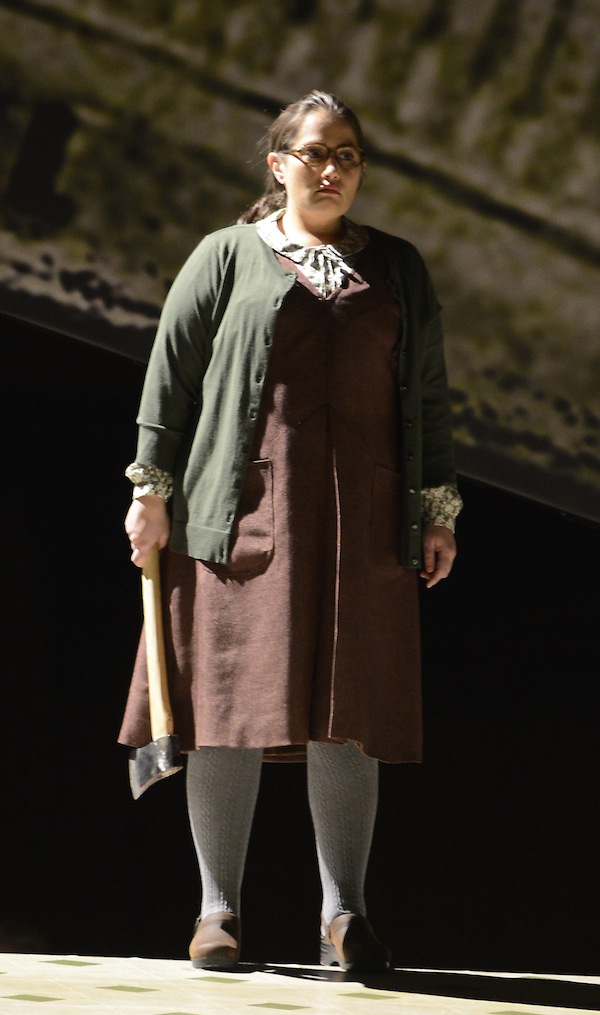BLO offers an updated “Lizzie Borden” that retains a sharp edge
When it comes to sensational murder trials, Lizzie Borden started it all. Though tried and acquitted for killing her father and stepmother with an axe, neither popular nor artistic imagination has been as forgiving. As the rhyme still goes, “Lizzie Borden took an axe / And gave her mother forty whacks. / When she saw what she had done / She gave her father forty-one.”
The Boston Lyric Opera’s second work of the season is Jack Beeson’s Lizzie Borden. It is part of the Opera Annex program, in which little-known modernist operas are mounted in intimate venues, this time in the Castle at Park Plaza. It is an opportunity for the company to take risks in repertoire, staging, and directing. Here was an evening in which all the risks came together, the excellent singing and xx staging making for a riveting performance.
BLO’s performance Wednesday night was a condensed and updated version of Beeson’s 1965 original, reducing a three-act work into seven scenes without intermission. Although the BLO production team, in their liner notes, discuss how they see Lizzie’s story as an New England analogue to Elektra, Wednesday’s performance was blissfully light on the mythos, letting the production focus on Lizzie’s madness.
Beeson’s take on the murders is that Lizzie was, indeed, guilty; the opera is an account of how the events of one day drove Lizzie to insanity and to murder. Importantly, the performance fleshed out the tragic dimensions of Lizzie’s descent. Although Lizzie’s madness, as depicted in the opera, is exacerbated by her puritanical father, it is rooted in her own frustrated desire to be found attractive and to marry. Lizzie’s younger sister Margret’s elopement with a handsome sea captain triggers her own madness. Lizzie, out of sisterly generosity, aids Margaret in her escape, and it is her generosity that undoes her and leads to her tragedy.
As a depiction of insanity, however, and despite the strength of BLO’s production, Beeson’s opera has aged somewhat. The final stepping stone in Lizzie’s descent is a revelation of incestuous desire, but at Wednesday’s performance that felt more melodramatic than inevitable. Lizzie’s explicit uncertainty about whether or not her body was whole or her own—reminiscent of body dysmorphic or dissociative identity disorders—provided a truly terrifying and startlingly contemporary aspect to this depiction of madness.
The BLO’s production featured a brilliant cast of singers, all of whom sounded genuinely comfortable with Beeson’s musical language. Daniel Mobbs’ Andrew Borden is equal parts tyrant and petty patriarch, his handsome bass-baritone suited both for barking out reprimands and lusting after his new wife.
Caroline Worra nearly stole the show as the busty, leopard-printed, newly-married Abigail Borden. Even her breathing—husky from a cigarette—exuded character. The smoking fortunately didn’t affect her luscious soprano, which was equally capable of cutting coldly at her stepdaughters or teasing her husband with torrents of sound.
Chelsea Basler was appropriately tender as Margret, and her warm soprano was perfect for her initial meekness and later confidence. David McFerrin’s Captain Jason MacFarlane, Margret’s love interest, had a less meaty role, but his good looks and ringing tenor—save for some dryness in the uppermost reach—made it easy to understand why he had the Borden sisters’ attention.
Heather Johnson’s handling of the role of Lizzie was fearless, both vocally and physically. Her warm, dark mezzo tore into the arduous music, and she wasn’t afraid to let her own body be a canvas of Lizzie’s madness. Rounding out the cast was Omar Najmi, who lent his clear tenor to the small role of Reverend Harrington.
A final, crucial component to the success of the performance was the combination of Christopher Alden’s direction and Andrew Holland’s set design. The set, simply an elongated slice of linoleum tiled kitchen floor, elegantly captured the claustrophobic small-town America setting. This slice of floor, combined with Alden’s direction, in which the singers moved about the stage almost like objects instead of people, was an effective and subtle suggestion of madness.
Beeson’s angular score, though perhaps no longer avant-garde, has weathered well, and conductor David Angus led a tense, energetic reading. A cappella moments in particular were eerily disembodied, due in no small part to the Castle’s acoustics, and the score included a downright terrifying usage of a children’s choir, featuring the Pal’s Children’s Chorus.
Lizzie Borden plays at the Castle at Park Plaza through November 24. blo.org
Posted in Performances
